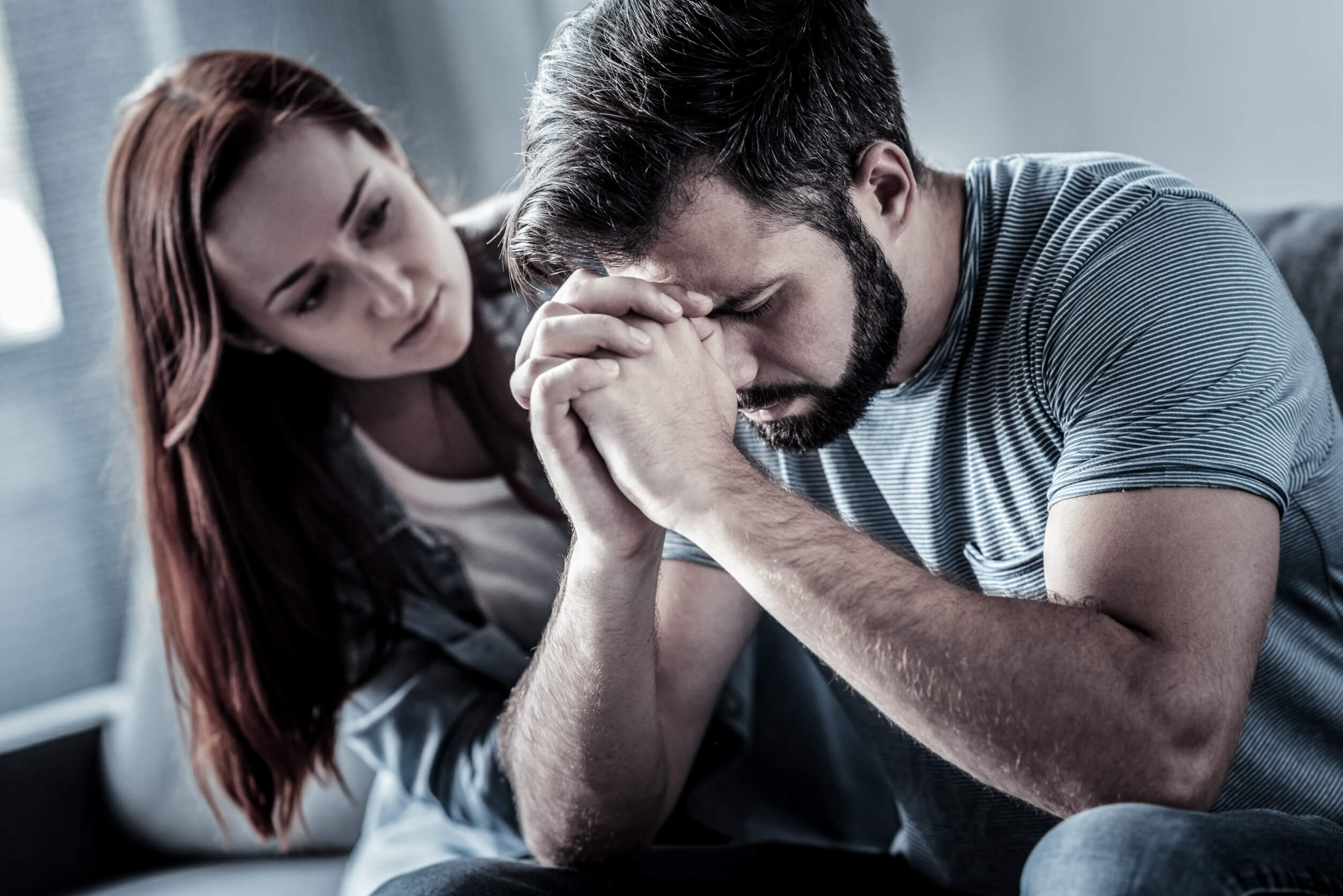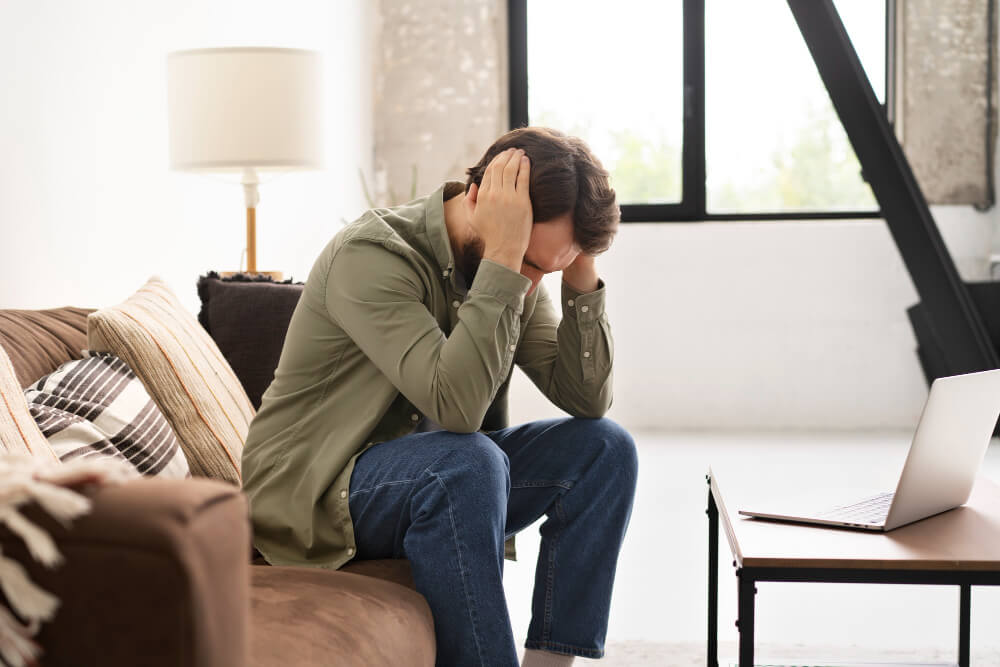Last updated: March 15th, 2025
Getting out of a depressive funk isn’t always easy. Even if you’ve gotten out of a funk before, the tricks you used to do this may not always work, and you might still find yourself feeling down. It’s tempting to “wait out” a depressive funk and hope that it will pass. Sometimes this strategy works, but often a funk won’t go away unless you do something to address it. Fortunately, there are things you can do – now – that are proven to help get you out of a depressive funk, including:
- Get moving
- Get outside
- Visit with family and friends
- Do something that you typically enjoy
- Do something that makes you feel accomplished
- Get plenty of rest
- Eat a healthy and balanced diet
These tips are straightforward, but are not always easy to put into practice. Read on to find out more about how you can use these strategies to help you get out of a depressive funk and start feeling better now.
How Long Does a Depressive Funk Last?
It’s hard to say exactly how long a depressive funk can last. It can be as brief as an hour or two, or a chunk of a day, up to lasting a few days – or even longer.
Here are some signs you may be in a funk:
- Giving up on participating in things you typically enjoy doing
- Withdrawing from family, friends, participating in your day-to-day life
- Sleeping more or less than usual
- Giving up on hygiene (showering, brushing teeth, changing clothes, grooming)
- Feeling like you don’t have much to look forward to
But when a funk goes on for longer than a week, it might be what’s called a major depressive episode. Major depressive episodes are a characteristic of depression and other mood disorders. A major depressive episode is when you feel either in a depressed mood most of the time, or you lose interest and pleasure in activities you typically enjoy for a period of at least two weeks. These changes in mood during a major depressive episode are often accompanied by other changes in appetite and sleep, low energy levels, feelings of worthlessness, poor concentration, and thoughts of death.
Melancholy vs. Depression: Is There a Difference?
Everyone feels melancholy (sadness, the blues, in low spirits) from time to time. Not everyone experiences depression, however, so there is an important difference between these two terms.
Feeling melancholy typically goes away or fades on its own, even if it takes some time, while depression is a mental health condition that may need treatment. One helpful way to think about it is to think of everyday sadness or melancholy as part of a continuum with depression, where depression represents the more intense or disruptive end of the spectrum. Either melancholy or depression could be contributing to a depressive funk. So, it can be helpful to consult with a mental health professional to determine what, if any treatment might be able to help.
Advice on Getting Out of a Depressive Funk
Whether or not you seek professional treatment for your depressive funk, there are some things you can start doing right now that can help. Here are some suggestions for things you can try now to get out of a depressive funk:
Get moving!
Exercise can be a great way to ease the feelings of a depressive funk. And don’t let the term “exercise” throw you – even a modest amount of movement and activity can help boost mood and energy levels. If starting feels difficult, start small. A few minutes of gentle stretching, a brief walk at a moderate pace, or a handful of jumping jacks are examples of how you can start with just a bit of movement. The key here isn’t achieving a fitness or exercise goal, it’s breaking out of the inactivity that often accompanies a depressive funk.
Get outside!
Leave your home, school, or workplace and spend time outdoors. Just as mentioned above, this doesn’t need to be for lengthy periods of time, or to do intense activities. Fresh air and a change of scenery can really help lift mood, and with the right clothing, this is something you can do no matter the weather conditions.
Visit with family and friends!
Social connection can help you get out of a depressive funk by counteracting the tendency to withdraw or isolate, creating the opportunity to receive support, and helping you focus on things outside of your own thoughts and emotions. Just make sure you’re spending time with people who generally make you feel better when you’re around them.
Do something that you typically enjoy!
Even if the idea of doing a pleasant activity isn’t particularly…pleasant while you’re in a depressive funk, engaging in it anyway can help improve how you feel. For example, let’s say you typically enjoy baking cookies, but don’t feel up to it. Just going to the store, getting the necessary ingredients, and getting started may just bring on some much-needed pleasant feelings to boost your mood.
Do something that makes you feel accomplished!
Doing something that lends a sense of completion, accomplishment, or capability can do a lot to help you break out of a depressive funk. As with the other tips above, you don’t need to do something monumental. Start small – cleaning out one drawer of a dresser, tackling a chore you can complete in 3 minutes or less, replying to 1 email that you’ve been meaning to get to. Small actions such as these can add up and improve your mood.
Get plenty of rest!
Sometimes a depressive funk can come with a feeling of lethargy, but it can also result from not having enough time to relax, or from sleep deprivation. So, make sure you’re creating adequate opportunities to rest and sleep to help improve your mood.

Eat a healthy and balanced diet!
Mood and energy levels can dip when you’re not adequately nourished. If you’re having trouble bringing yourself to eat much at all, starting somewhere is better than aiming for top-notch nutrition. That said, choosing more nutrient-dense foods can help you keep your nutrition going even if you’re eating less overall than you typically do. This point is actually helpful for getting out of a funk even if you’re already eating a normal or close to normal amount.
The above tips are inspired by two aspects of cognitive-behavioral therapy (CBT). One is behavioral activation, a specific CBT treatment for depression. The other is ABC PLEASE, a set of skills used in dialectical behavior therapy (DBT). Both approaches can help improve mood. They are two tools you might benefit from if you seek professional help for getting out of a funk, or for the treatment of depression.
Which Hormones or Neurotransmitters Are Responsible for Depression?
Neurotransmitters are chemicals produced in your body that the nerve cells in your brain use to communicate with each other. The communication between brain cells play a role in regulating your mood, as well as carrying out many other brain functions. Because of this, neurotransmitters can play a role in depression. Below are some of the primary neurotransmitters believed to be related to depression:
Serotonin (5-hydroxytryptamine, or 5-HT)
Serotonin plays many roles in your body. Some of the psychological ones it plays include regulating mood and happiness, as well as the brain processes involved in memory and learning.
Low levels of serotonin are believed to play a role in depression, which is why many antidepressant medications aim to increase the amount of serotonin available for your brain cells to use. For example, many popular antidepressant medications are selective serotonin reuptake inhibitors (SSRIs) or serotonin and norepinephrine reuptake inhibitors (SNRIs).
Serotonin is also important for other non-psychological functions, such as regulating your body temperature, sleep, hunger, and sexual function. And even though it’s an important neurotransmitter, the majority of the serotonin in your body is actually found in your intestinal tract. These other functions help explain why the side effects of medications that impact serotonin often show up in these ways, as well as why GI symptoms can sometimes accompany depression and other mood problems.
Norepinephrine (NE)
Norepinephrine is both a neurotransmitter and a hormone. In your brain, it serves several functions that include influencing your mood, memory processes, as well as your sleep-wake cycle. As with serotonin, lower levels of norepinephrine can play a role in depression. That’s why some antidepressant medications target norepinephrine, including serotonin and norepinephrine reuptake inhibitors (SNRIs) as well as norepinephrine and dopamine reuptake inhibitors (NDRIs).
Norepinephrine also helps the body constrict blood vessels to keep blood pressure elevated and increases your alertness and attention during stressful situations.
Dopamine (DA)
Dopamine is a neurotransmitter that is part of your reward system. It’s released in your brain when you’re doing something pleasurable. This both increases your sense of pleasure as well as your motivation to continue doing that pleasurable activity and to do it again in the future.
Dopamine can play a role in the loss of pleasure with activities that are typically enjoyable when you’re in a depressive funk, or if you’re experiencing depression, as well as decreases in motivation. Withdrawal due to these symptoms can further reduce dopamine levels and contribute to depression. Again, this is why some antidepressant medications aim to increase dopamine, such as norepinephrine and dopamine reuptake inhibitors (NDRIs).
The “chemical imbalance” theory
It has long been thought a primary factor in the onset of depression is a “chemical imbalance” in neurotransmitters in the brain. So, the idea was that treating this imbalance would treat depressive symptoms.
However, as scientific research has progressed, evidence suggests that this idea is less accurate than previously believed. Instead, it seems that depression is caused by a more complex set of influences. These include neurotransmitter levels but also life experiences, thinking and behavioral patterns, prior learning, and other psychological and physiological factors. However, it’s still quite common to hear people refer to depression as a matter of chemical imbalance.
Summary
Depressive funks are something that many people experience at some point in time. While these sometimes pass on their own, there’s no reason to suffer – there are things you can start doing now to get you on the road to feeling better. The actions described above are known to be the most helpful for getting out of a depressive funk. Incorporating more movement into your day, getting outside, spending time with loved ones, and eating a balanced diet may sound like cliches for improving mood, but evidence supports they’re quite helpful.
Depression is a mental health condition that can look like a depressive funk, but lasts longer and has a more pronounced negative impact on your wellbeing. So, if your funk is lasting more than a week or so, and you are having depressed mood, losing interest and pleasure in activities you typically enjoy, changes in appetite and sleep, low energy levels, feelings of worthlessness, poor concentration, or thoughts of death, you should consult with a mental health professional to determine what treatments might be helpful for you.
Cognitive-behavioral therapy (CBT) uses treatments proven to improve mood – both for depressive funks as well as for depression. Please get in touch with us if these conditions pose challenges in your life – relief is possible.
How To Get Out of a Depressive Funk – Frequently Asked Questions (FAQs)
What Is the First Step in Overcoming Depression?
The first step in overcoming depression is acknowledging that you’re in a funk. After that, try to get moving, get outside, spend time with loved ones, do something pleasurable, and do something that makes you feel accomplished.
Is a Depressive Funk the Same as Depression?
A depressive funk and depression are not necessarily the same, but can be two points on the same continuum. Not every depressive funk means you’re experiencing depression, but if you are experiencing depression, you’re most likely going to feel that you’re in a funk.
How Can I Increase Serotonin and Dopamine Naturally?
Research suggests there are some ways to increases your serotonin and dopamine levels naturally:
- To increase serotonin, you should get more exposure to sunlight, get more exercise, and try to lower your stress levels. You might also consider eating foods that contain tryptophan (an amino acid your body uses in the production of serotonin) or taking certain supplements.
- To increase dopamine, you should engage in activities that you find pleasurable or make you feel relaxed. You might also consider eating foods high in magnesium and tyrosine (an amino acid your body uses in the production of dopamine) or taking certain supplements.
What Triggers Melancholic Depression?
Melancholic depression is a type of clinical depression that affects 25 to 30% of people with major depression. It’s characterized by severe loss of pleasure and by physiological changes such as weight loss and sleep disruption. Studies have shown that melancholic depression is associated with high secretion levels of the hormone cortisol. Not much is known about whether this type of depression is triggered by different factors those relevant to other types of depression. Generally, life changes and other mental health conditions can cause depression, as can genetic factors, pessimistic and self-critical thinking, and isolation and loneliness.
If you’d like help in getting out of a depressive funk, please get in touch with us at the Manhattan Center for Cognitive-Behavioral Therapy.










